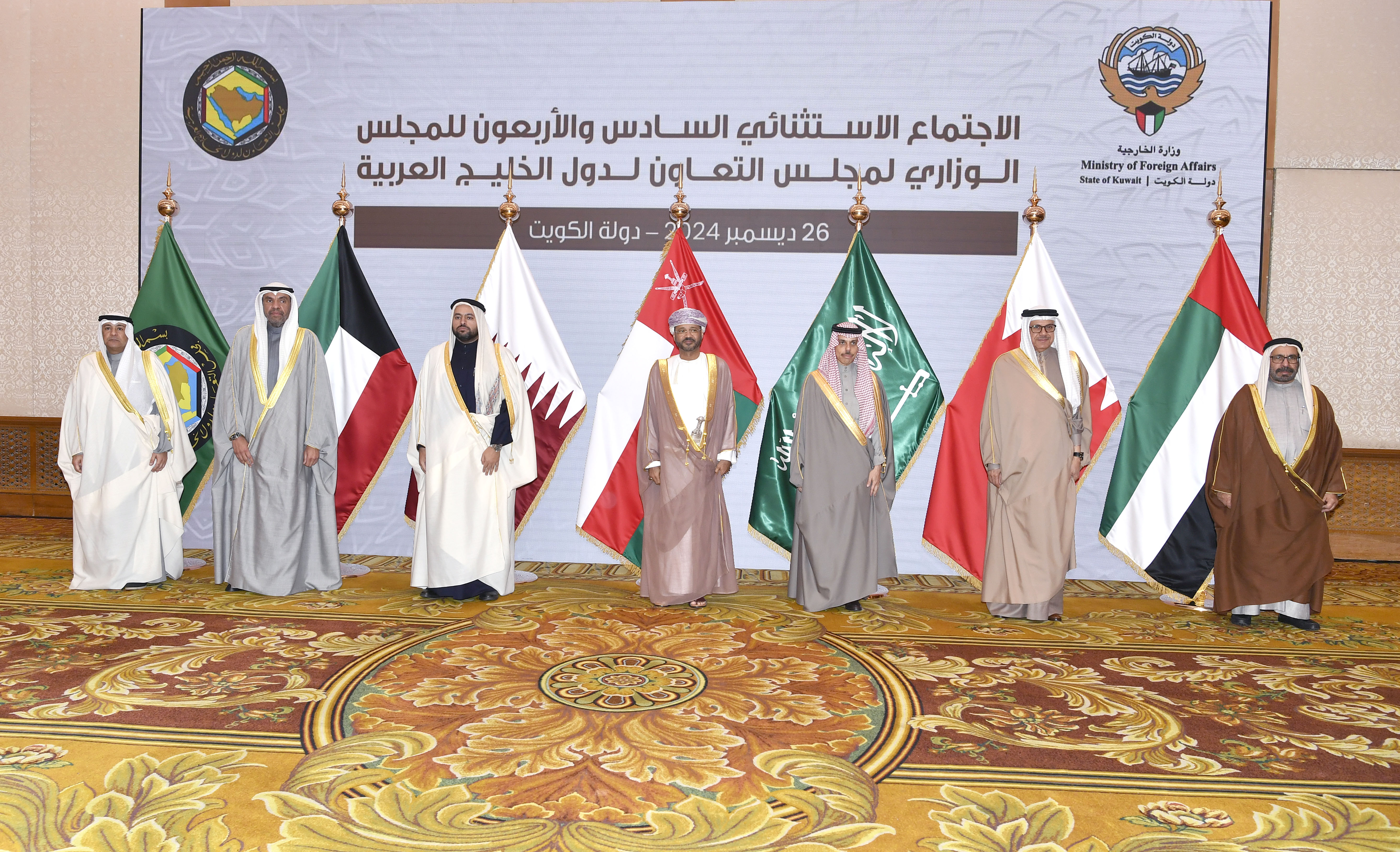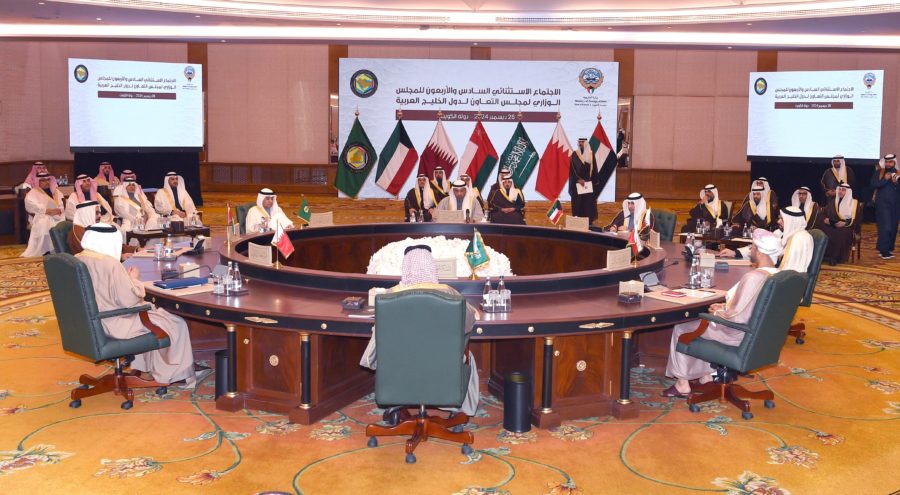The Gulf Cooperation Council (GCC) convened the 46th extraordinary meeting of the Ministerial Council in Kuwait to address ongoing events in the Syria and Lebanon.
As with the rest of the world, the rapid fall of the Assad regime in Syria has created new political and social dynamics that states in the region are working to understand and, ultimately, effectively manage.
Each of the GCC members reaffirmed the need to uphold Syria’s sovereignty, independence, and territorial integrity; reject foreign interference; lift Western sanctions; support a transition process that ensures civilian safety, achieves national reconciliation, and preserves state institutions; condemn Israeli attacks on Syria and expanded settlements in the occupied Golan Heights and; Israeli strikes on Lebanon.
In addition, as Kristin Diwan Smith observed in her commentary for AGSIW, ‘Assad’s Fall Prompts Initial Gulf Unity but Differences and Concerns Are Emerging’, “Gulf leaders will be weighing the tradeoffs from the diminishing of Iran’s geopolitical position and strengthening of Turkey’s hand in the region. But there is another calculation that has largely gone unstated: What does it mean that a long-standing Arab leader has been overthrown by a popular – and at least ostensibly Islamist – rebellion?”
Qatar, which maintained ties with the Islamist opposition in Syria, has been active in engaging with Syria’s new leadership. The UAE remains cautious with Anwar Gargash, diplomatic advisor to the UAE president noting that, “The nature of the new forces, the affiliation with the (Muslim) Brotherhood, the affiliation with Al-Qaeda, I think these are all indicators that are quite worrying. We have to be optimistic on the one hand and help Syrians … but at the same time we can’t ignore the region has seen episodes like this before, so we need to be on guard.”
Diwan Smith observes that, with regard to Saudi Arabia: “It is difficult to say where the Saudi public stands now, but it is notable that the country’s public reporting expressed a degree of enthusiasm over Assad’s defeat at the hand of the revolutionaries, and important analysts have expressed the importance of Saudi and Gulf support for the new government. The leadership seems to be offering cautious support, seeing the opportunity to further weaken Iranian influence and solidify its own standing with the Saudi public and leadership within the broader Arab Islamic community.”
The commander-in-chief of the new Syrian administration, Ahmad al-Sharaa, stressed to Asharq Al-Awsat that,“the Syrian revolution ended with the fall of the regime and we will not allow it to be exported to any other place,” noting that his country “will not be a platform for attacking or raising concerns for any Arab or Gulf state, no matter who it is.”
He added that, “The Kingdom of Saudi Arabia has put in place very bold plans and has a development vision that we also aspire to. There is no doubt that there are many intersections with what we aspire to, and we can meet there, whether in terms of economic or development cooperation or otherwise.”
The attendees discussed the developments Syria witnessed in the past weeks and stressed the following: Stand by the people of Syrian, provide all aid and support to them at this critical stage, and respect their will and choices.
Support a peaceful, inclusive Syrian-Syrian political transitional process, in which all Syrian political and social forces are represented, including women, youth and civil society, with justice, sponsored by the United Nations and the Arab League, and in accordance with the principles, objectives and mechanisms of Security Council Resolution No. 2254, including the formation of an inclusive transitional governing body with Syrian consensus, and beginning to implement the steps specified by the resolution to move from the transitional phase to a new political system that meets the aspirations of the Syrian people with all its components, through free and fair elections supervised by the United Nations, based on a new constitution approved by the Syrians, and within specific timeframes according to the mechanisms adopted by the resolution.
Support the role of the UN envoy to Syria, and ask the UN Secretary-General to provide him with all necessary capacities and embark on establishing a UN mission to assist and sponsor Syria’s transitional process and the Syrian people in achieving a political process led by the Syrians in accordance with Resolution 2254.
This delicate stage requires a comprehensive national dialogue and the solidarity of the Syrian people with all its components, spectrums, and political and social forces to build a free, secure, stable, and unified Syria that the Syrian people deserve after long years of suffering and sacrifices.
Immediately cease all military operations. Respect of the rights of the Syrian people with all its components, without any discrimination based on race, sect, or religion, and ensure justice and equality for all citizens.
Preserve the institutions of the Syrian state and enhance their ability to carry out their roles in serving the Syrian people and protecting Syria from slipping into chaos, and work immediately to empower a police apparatus to protect citizens, their property, and the resources of the Syrian state.
Commitment to enhancing efforts to combat terrorism and cooperating in that endeavor, as terrorism poses a threat to Syria and the security of the region and the world, and that defeating it is a collective priority.
Full solidarity with the Syrian Arab Republic in safeguarding its unity, territorial integrity, sovereignty, security, stability and the safety of its people.
Provide the humanitarian support needed by the Syrian people, including through cooperation with relevant United Nations organizations.
Create the security, living and political conditions for the voluntary return of Syrian refugees to their country, and provide all necessary assistance for this purpose, in cooperation with relevant United Nations organizations.
Achieve national reconciliation and the principles of transitional justice in accordance with legal and humanitarian standards without vengeance, and stop the bloodshed of the Syrian people who deserve to end their suffering.
Condemn Israel’s incursion into the buffer zone with Syria and a series of adjacent sites in Mount Hermon, Quneitra Governorate and the Damascus countryside, as a heinous occupation and violation of international law and the 1974 disengagement agreement between Syria and Israel, demand the withdrawal of Israeli forces, denounce Israeli raids on other areas and facilities in Syria, reaffirm that the Golan Heights is an occupied Arab Syrian land, whose occupation must end, and demand the Security Council take the necessary action to stop these violations.
Syria’s security and stability are a pillar of the region’s security and stability, and we will stand with its people in the process of rebuilding a unified, independent, stable and secure Arab state for all its people, in which there is no place for terrorism or extremism, and no violation of its sovereignty and territorial integrity by anyone.
Dealing with the new reality in Syria depends on its consistency with the principles and foundations above, and in a manner to meet the common goal of fulfilling the rights and aspirations of the Syrian people.
Coordinate with the rest of the Arab countries to hold a meeting of the Arab League Council to submit to it the committee’s report on this meeting.
Communicate with partners in the international community to formulate a comprehensive position to support Syria in its bid to build the future that the Syrian people deserve, in line with the principles agreed upon above, and in accordance with the relevant Security Council resolutions. (QNA)










